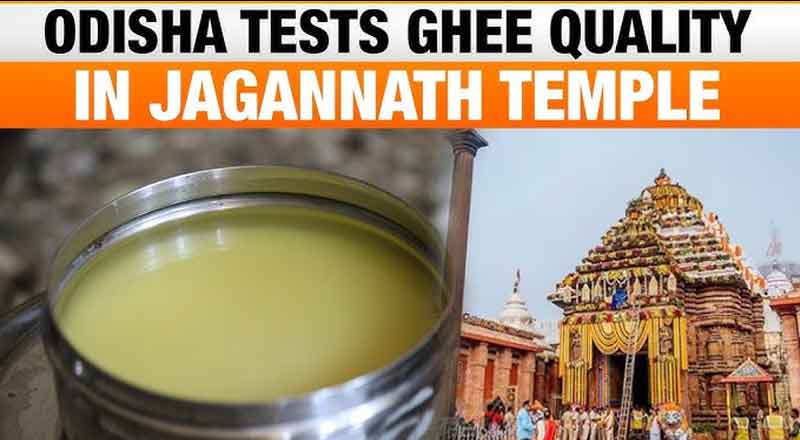The Odisha government has decided to test the quality of ghee used in the preparation of offerings at the Jagannath temple in Puri. This decision comes in the wake of a controversy surrounding the alleged use of animal fat in the ghee used to make laddoos at the Tirumala temple in Andhra Pradesh.
Background of the Controversy
The controversy began when Andhra Pradesh Chief Minister N Chandrababu Naidu accused the previous YSR Congress Party (YSRCP) government of using substandard ingredients, including animal fats, in the preparation of laddoos offered at the Tirumala temple. The accusation sparked widespread concern among devotees and temple authorities across India, leading to heightened scrutiny of the ingredients used in temple offerings.
Although no such allegations have been raised in Puri, the district administration has decided to proactively test the quality of ghee used at the 12th-century Jagannath temple. This move aims to ensure transparency and maintain the trust of the devotees.
Quality Checks at Puri Jagannath Temple
Puri’s District Collector, Siddharth Shankar Swain, announced that the ghee used in the temple’s ‘Kotha Bhoga’ (prasad offered to the deities) and ‘Baradi Bhoga’ (prasad provided on order) would be thoroughly tested. The state-run Odisha Milk Federation (Omfed) is the sole supplier of ghee for the temple’s prasad preparation.
Swain emphasized that although there have been no allegations of adulteration in Puri, the administration wants to ensure that the ghee meets all quality standards. “A decision has been taken to examine the standard of ghee being supplied by Omfed to allay any fear of adulteration,” he stated. The administration plans to hold discussions with Omfed representatives as well as the temple’s servitors, who are responsible for preparing the prasad, to ensure that the ghee used is of the highest quality.
Concerns Raised by Servitors
Jagannath Swain Mohapatra, a senior servitor at the temple, expressed his support for the decision to test the ghee. He recalled past instances where adulterated ghee was reportedly used for lighting lamps (diyas) within the temple premises. According to Mohapatra, these practices have since been discontinued, but he emphasized the importance of conducting a comprehensive test of the ghee currently being used. “We will request the temple’s chief administrator for a complete test of the ghee used here,” he said, highlighting that maintaining the faith of devotees is of utmost importance.
Implications for Devotees and Temple Practices
The quality of prasad offered in temples holds significant religious and cultural importance in India. Any concerns about the ingredients used in these offerings can have a profound impact on the faith and trust of devotees. The Odisha government’s decision to test the ghee at the Jagannath temple is a proactive step to ensure that the sanctity of the temple’s offerings is preserved.
This move also reflects a broader trend of increased vigilance and transparency in temple practices across the country. As temple administrations face growing scrutiny from both the public and government authorities, ensuring the purity and quality of prasad is becoming a priority.
The Odisha government’s decision to test the ghee used at the Puri Jagannath temple underscores the importance of maintaining the highest standards in the preparation of temple offerings. While no allegations of adulteration have been raised in Puri, the proactive approach taken by the administration aims to preserve the trust and faith of devotees. As the Tirupati Laddoo controversy continues to unfold, other temples across India may also take similar measures to ensure the purity of their offerings, reinforcing the cultural and religious significance of these practices.
(With inputs from agencies)





